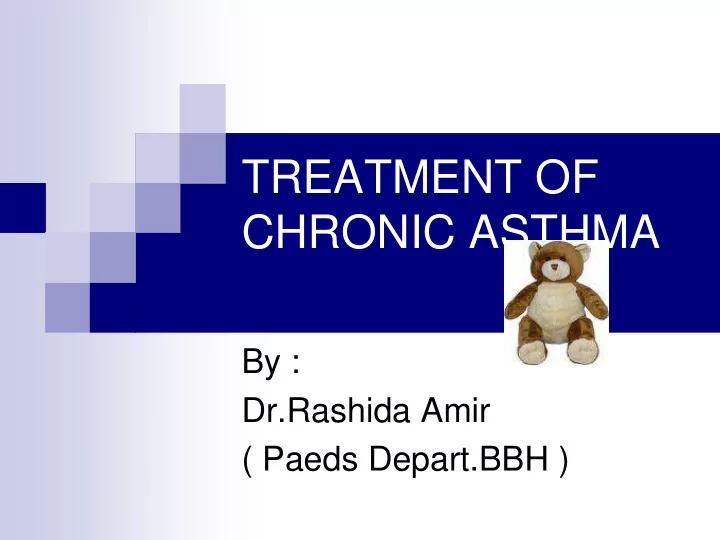

TREATMENT OF CHRONIC ASTHMA By : Dr.Rashida Amir ( Paeds Depart.BBH )
Components of Optimal Asthma Management Regular Assessment & Monitoring 1) Control Of Factors Contributing To 2) Asthma Severity Asthma Pharmacotherapy 3) Patient Education 4)
1. Regular Assessment & Monitoring To determine : # frequency of asthma symptoms # frequency of “ rescue” SABA medication use # no & severity of asthma exacerbations # participation in activities
Asthma checkups : # every 2-4 wks until good control is achieved # 2-4 checkups/yr to maintain good control Lung Function Monitoring : # spirometry (at least annually )
2. Control of Factors Contributing to Asthma Severity Eliminate & Reduce Problematic Environmental Exposures : • tobacco smoke • allergens ( pets , pests , dust mites , cockroaches , molds ) • airway irritants ( wood / coal smoke , dust perfumes , chemical ,
Treat co-morbid conditions : • Rhinitis • Sinusitis • Gastroesophageal reflux Annual Influenza Vaccination : ( unless egg-allergic )
3. Asthma Pharmacotherapy A. Quick- Reliever “ Rescue” Medications B. Long- Term Controller “ Daily” Medications
A. Quick- Reliever “ Rescue” Medications Short-acting inhaled B-agonists i. ( SABA ) : albuterol ; levabuterol ; terbutaline ; pirbuterol Anticholinergic agents : ii. ipratropium bromide iii. Short-acting systemic corticosteroids
Modes of Delivery / Use : MDI ( metered – dose inhaler ) DPI ( dry powder inhaler ) Nebulizers Suspension / Syp
B. Long- term Controller “ Daily” Medications used when : “ Three Strikes” Rule children with frequent exacerbations ( 2 exacerbations < 6 wks apart )
Medications ICSs ( Inhaled Corticosteroids ) i. Systemic Corticosteroids ii. LABA iii. Leukotriene-Modifying Agents iv. NSAIDs v. Methylxanthines vi. Anti - IGE vii.
i. ICSs ( Inhaled Corticosteroids ) 05 approved ICSs by FDA adverse effects : oral candidiasis ( thrush ) o - due to mucosal irritation & - local immunosuppression dysphonia ( hoarse voice ) o - due to vocal cord myopathy
ii. Systemic Corticosteroids prednisone prednisolone methylprednisolone
iii. LABA ( Long-Acting Inhaled B- Agonists ) Salmeterol & Formoterol Duration of effect = 12 hr
iv. Leukotriene-Modifying Agents 02 classes : leukotriene synthesis inhibitors a) eg. Zileuton ( not approved in < 12yrs ) leukotriene receptor antagonists ( LTRA) a) eg. Montelukast ( > 01yr of age ; OD ) Zafirlukast ( > 05yrs of age ; BD )
v. NSAIDs cromolyn & nedocromil Dose = 2 -4 times / day
vi. Methylxanthines Theophylline ( phosphodiesterase inhibitor ) alternative monotherapy controller agent ( for older children ) adverse effects : headache ; poor concentration ; insomnia ; vomiting ; seizures
vii. Anti - IGE Omalizumab humanized monoclonal antibody > 12yrs of age every 2 -4 wks s/c
Step-wise Approach of Management i.e. STEP – UP ; STEP – DOWN Based on asthma severity
Classification of Asthma Severity classificatio step Days with Nights with n symptoms symptoms Severe 4 continual frequent persistent Moderate 3 daily > 1 / wk persistent Mild 2 2 / wk but > 2 /month persistent < 1time/day Mild 1 < 2 / wk < 2 /month intermittent
4. Patient Education Specify goals of management explain basic facts address concerns teach / demonstrate proper technique investigate & manage factors contributing to asthma severity
written 2-part asthma management plan : Daily “ routine” management plan 1. Action plan for asthma exacerbations 2. Regular follow-up visits - 2 – 4 / yr - monitor lung function annually
THANK YOU
Recommend
More recommend